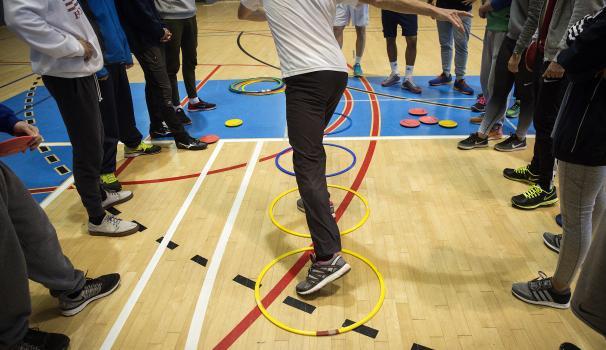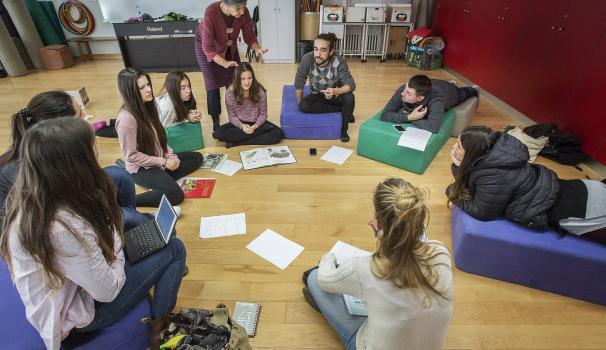Prevention, assessment, diagnosis and treatment
Disorders in communication, oral and written language, speech, hearing, voice and non-verbal oral functions.
Enrolment open

8 a.m. to 2 p.m.
Blanquerna-URL - Carrer del Císter, 34. 08022 Barcelona
School of Psychology, Education and Sport Science
For anyone who wants to take on a challenge: to understand life as an ongoing learning process in the functioning of human communication, language, voice and swallowing. Being a speech therapist means transmitting to your patients or customers the challenge of getting to know themselves better, in order to take the next step: finding better ways of communicating and living better.
Découvrez l'Orthophonie!
The bachelor's degree in Speech and Language Therapy is also adapted to receive French-speaking students. If this is your case, visit the specific website.
Disorders in communication, oral and written language, speech, hearing, voice and non-verbal oral functions.
Management, coordination, and organization of multidisciplinary services and teams.
Academic work in studies related to human communication and speech and language therapy.
A high degree of occupational integration and a solid education in applied speech and language therapy
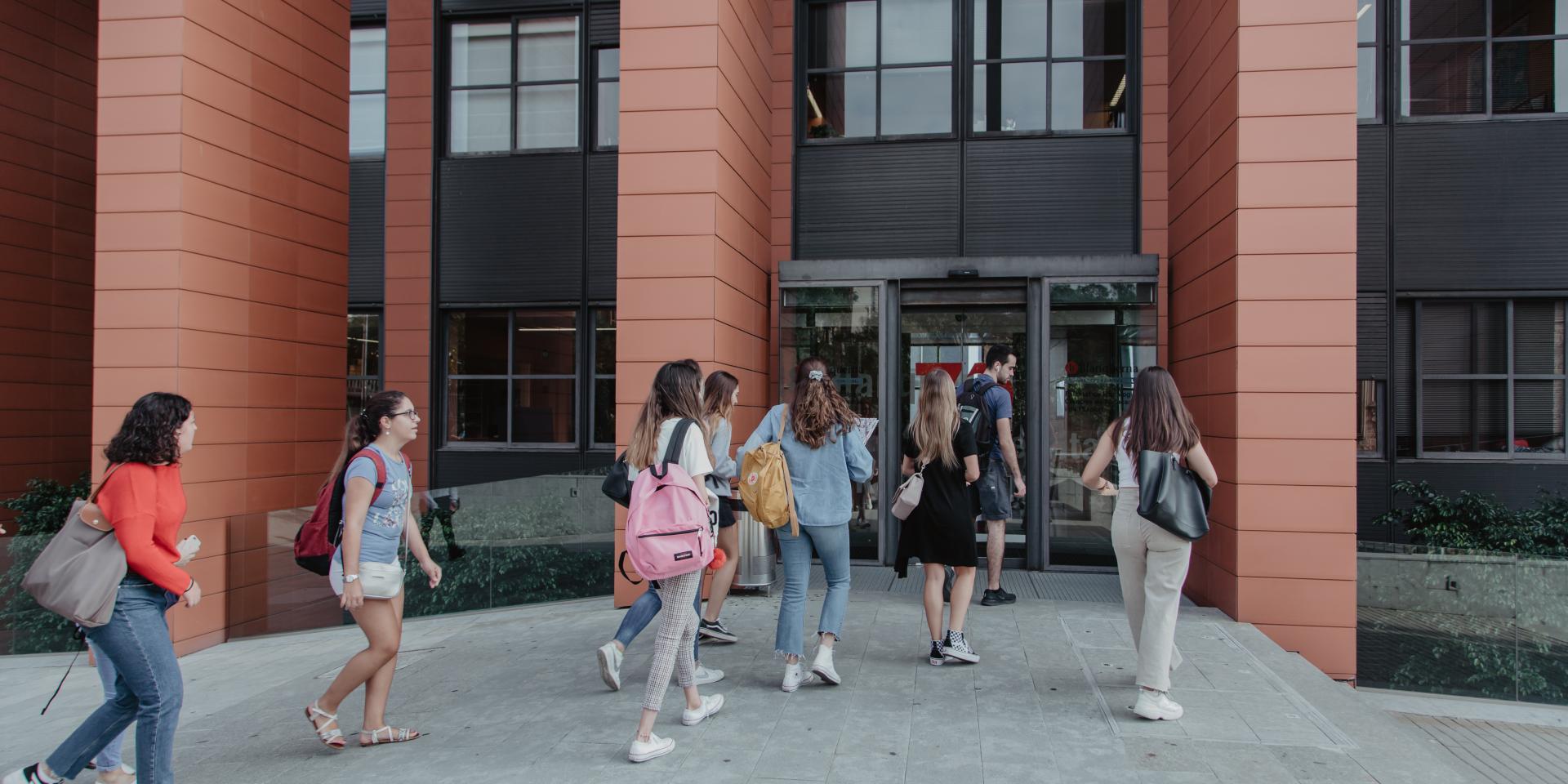
The Blanquerna-URL bachelor's degree in Speech and Language Therapy trains you to respond to demands in different contexts and areas:
Hospitals, sociomedical centers, private practices, nursing homes, etc.
Teaching in special needs education centers and schools.
Basic and applied scientific work.
employment rate
Assessment in teaching and learning according to the AQU satisfaction survey (above average).
agreements with renowned internship centers
in Occupational Quality, the best percentage of all bachelor's degrees (average of 58.50%).
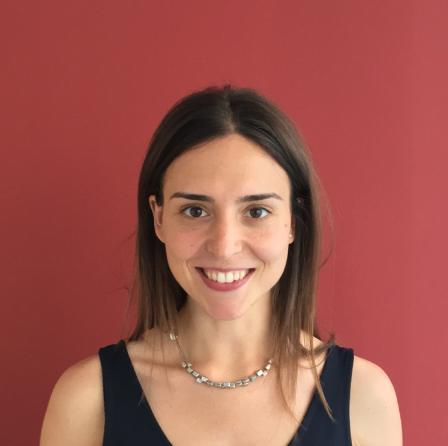
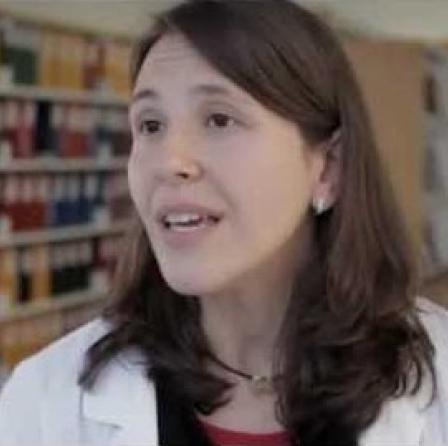
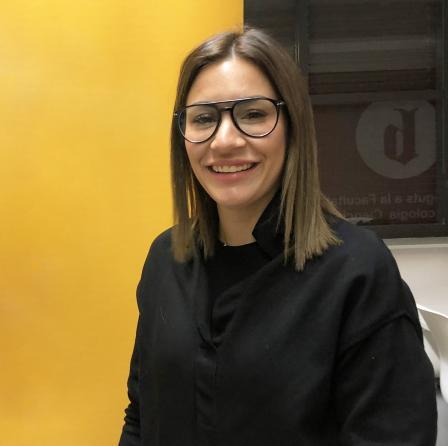
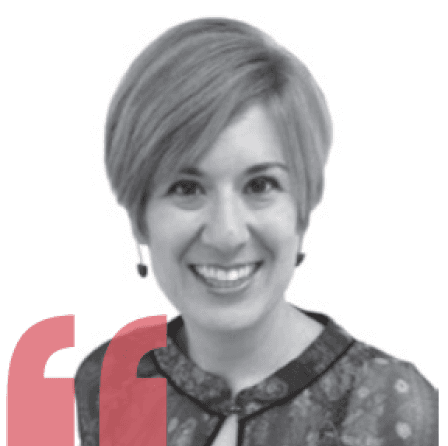
The Blanquerna methodology is based on seminars, a core element in achieving personalized and qualitative learning and holistic training that includes not only academic and professional competencies but also personal and human skills.
Seminars with small groups of 10-12 students facilitate interdisciplinary learning, intellectual and professional reflection, and customized learning. The faculty advisor collaborates in students' academic, personal and vocational orientation.
We have agreements with more than one thousand internship centers and a 95% job placement. Internships are carried out in pioneering and innovative organizations, institutions and schools that allow you to vindicate everything you have learned during the degree.
Studying abroad is a life-changing experience. We offer you the opportunity to take part in various exchange programs and international cooperation programs and to do internships abroad. Furthermore, the curriculum includes training to obtain B2 level English certification.
ApS (Learning and Service) is a complex activity that integrates service to the community with learning: one of the main ideas is that our students can learn by accompanying other social institutions and continue to grow in the acquisition of values and critical thinking. These are activities or projects in which learning is linked to performing a real service.

Study for two majors simultaneously, consecutively or following a track tailored to you
News
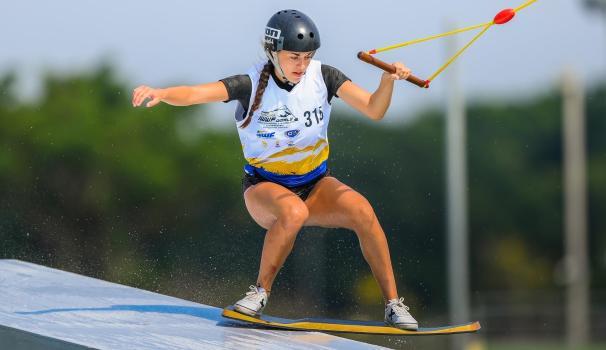
July 20, 2023

April 24, 2023
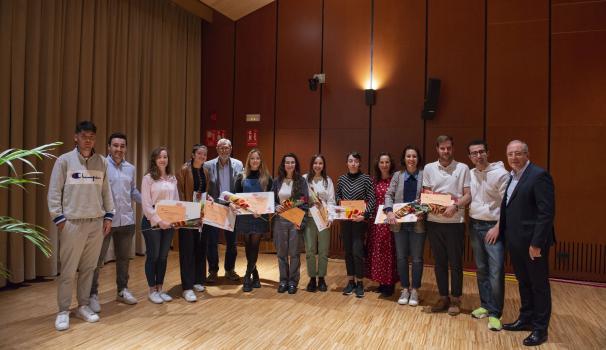
April 21, 2023

April 18, 2023

Blanquerna is a university with an international vision. Every year, we welcome students from all over the world wishing to study a full bachelor degree at our center. You could be among them.
Our curriculum offers updated and dynamic training, designed to connect theory and practice from the very beginning. For the first two years, you will discover the career reality at the round tables on professional contexts organized at the School annually. Between the 3rd and 4th year, you will have four internship periods in prestigious external facilities which will provide you with valuable practical experience and prepare you to face the challenges of the sector with confidence.
| First | Second | Third | Fourth | Total | |||
| Final degree project | 6 | 6 | |||||
| Core curriculum | 42 | 18 | 60 | ||||
| Internships | 12 | 12 | 24 | ||||
| Compulsory | 18 | 42 | 48 | 30 | 138 | ||
| Optional | 12 | 12 | |||||
| Total | 60 | 60 | 60 | 60 | 240 |
| Subject | Credits | Academic type | |
| First semester | |||
| General Linguistics | 6 | Core curriculum | |
| Behavioral neuroscience | 6 | Core curriculum | |
| Methodology for University Work | 6 | Core curriculum | |
| Basic Psychology | 6 | Core curriculum | |
| Introduction to the theories and models of speech therapy | 6 | Compulsory | |
| Seminar I: Written communication | 0 | Compulsory | |
| Second semester | |||
| Biological bases of communication: Anatomy and Physiology | 6 | Core curriculum | |
| Foundations of Human Communication | 6 | Core curriculum | |
| Applied Linguistics | 6 | Core curriculum | |
| Communication and expression | 6 | Compulsory | |
| Social Psychology | 6 | Compulsory | |
| Seminar II: Oral Communication | 0 | Compulsory | |
| Subject | Credits | Academic type | |
| Third semester | |||
| Developmental Psychology | 6 | Core curriculum | |
| Foundations of the Scientific Method | 6 | Core curriculum | |
| Brain functions | 6 | Core curriculum | |
| Augmentative communication | 6 | Compulsory | |
| Methodology for the evaluation and exploration of language | 6 | Compulsory | |
| Seminar III: Anatomophysiology and ApS | 0 | Compulsory | |
| Fourth semester | |||
| Evaluation of speech disorders | 6 | Compulsory | |
| Disorders and exploration of voice | 6 | Compulsory | |
| Disorders and exploration of children's oral language | 6 | Compulsory | |
| Disorders and exploration of children's written language | 6 | Compulsory | |
| Seminar IV: Professional and personal skills | 0 | Compulsory | |
| Annual | |||
| English B2 | 6 | Compulsory | |
| Subject | Credits | Academic type | |
| Fifth semester | |||
| Disorders, exploration and intervention of swallowing disorders | 6 | Compulsory | |
| Intervention in speech disorders | 6 | Compulsory | |
| Intervention in voice disorders | 6 | Compulsory | |
| Intervention in children's language development disorders | 6 | Compulsory | |
| Practical Placement I | 6 | Practicum | |
| Seminar V: Prevention and intervention contexts | 0 | Compulsory | |
| Sixth semester | |||
| Anthropology | 6 | Compulsory | |
| Research methods | 6 | Compulsory | |
| Language Disorders and Examination in Adults | 6 | Compulsory | |
| Hearing disorders, exploration and hearing aids | 6 | Compulsory | |
| Practical placement II | 6 | Practicum | |
| Seminar VI: Multiculturalism and intervention models | 0 | Compulsory | |
| Subject | Credits | Academic type | |
| Seventh semester | |||
| Contemporary thinking | 6 | Compulsory | |
| Ethics and deontology | 6 | Compulsory | |
| Intervention in acquired language disorders | 6 | Compulsory | |
| Intervention in hearing disorders | 6 | Compulsory | |
| Practical Placement III | 6 | Practicum | |
| Seminar VII: Transition to the professional world | 0 | Compulsory | |
| Eighth semester | |||
| Clinical cases seminar | 6 | Compulsory | |
| Clinical cases seminar II | 6 | Optional | |
| Speech therapy in communication and language disorders associated with intellectual disability and autism spectrum disorders | 6 | Optional | |
| Practical Placement IV | 6 | Practicum | |
| Seminar VIII: Synthesis of learning | 0 | Compulsory | |
| Final degree project | 6 | Final degree project | |
| First | Second | Third | Fourth | Total | |||
| Practicum | 12 | 12 | 24 | ||||
| Final degree project | 12 | 12 | |||||
| Core curriculum | 48 | 12 | 60 | ||||
| Compulsory | 12 | 48 | 48 | 18 | 126 | ||
| Optional | 18 | 18 | |||||
| Total | 60 | 60 | 60 | 60 | 240 |
| Subject | |||
| First semester | |||
| Linguistic Bases of Communication | 6 | Core curriculum | |
| Human Development | 6 | Core curriculum | |
| Language and Cognition | 6 | Core curriculum | |
| Biological Bases I | 6 | Core curriculum | |
| Seminari: Introduction to Speech and Language Therapy | 6 | Compulsory | |
| Second semester | |||
| Fundamentals of the Scientific Method | 6 | Core curriculum | |
| Biological Bases II | 6 | Core curriculum | |
| Development of Communication | 6 | Core curriculum | |
| Neuroanatomy and Physiology | 6 | Core curriculum | |
| Body and Voice in Communication | 6 | Compulsory |
| Subject | |||
| Third semester | |||
| Speech disorders and speech therapy | 6 | Compulsory | |
| Language Development Disorders and Examination | 6 | Compulsory | |
| Language-Based Learning Disabilities: Examination | 6 | Compulsory | |
| Disorders, Examination and Intervention in the Autistic Spectrum | 6 | Compulsory | |
| Logopedia en Entornos Educativos y Comunitarios | 6 | Core curriculum | |
| Fourth semester | |||
| Intervention in Speech Disorders | 6 | Compulsory | |
| Intervention in Language Development Disorders | 6 | Compulsory | |
| Intervention in Language-Based Learning Disabilities | 6 | Compulsory | |
| Disorders, Examination and Intervention in Intellectual Disability | 6 | Compulsory | |
| Speech and Language Therapy in Clinical and Hospital Settings | 6 | Core curriculum |
| Subject | |||
| Fifth semester | |||
| Medical Anthropology | 6 | Compulsory | |
| Practicum I | 6 | Practicum | |
| Acquired Language Disorders: Examination | 6 | Compulsory | |
| Disorders, Examination and Intervention in Deglutition | 6 | Compulsory | |
| Voice Disorders and Examination | 6 | Compulsory | |
| Sixth semester | |||
| Humanities: Contemporary Thinking | 6 | Compulsory | |
| Intervention in Acquired Language Disorders | 6 | Compulsory | |
| Hearing Disorders, Examination and Intervention: Audiology | 6 | Compulsory | |
| Practicum II | 6 | Practicum | |
| Practicum II (Specialisation in Children?s Speech and Language Therapy) | 6 | Practicum | |
| Practicum II (specialisation in Clinical/Hospital Speech and Language Therapy) | 6 | Practicum |
| Subject | |||
| Seventh semester | |||
| Research Methods | 6 | Compulsory | |
| Clinical cases | 6 | Compulsory | |
| Speech and Language Therapy in Educational Settings | 3 | Optional | |
| Clinical and Hospital Practice | 3 | Optional | |
| Speech and Language Therapy in Healthcare Settings | 3 | Optional | |
| Speech and Language Intervention in Prosthetic Audiology | 3 | Optional | |
| Practicum III: Ethics and Deontology | 6 | Practicum | |
| Practicum III: Ethics and Deontology (specialisation in Children?s Speech and Language Therapy) | 6 | Practicum | |
| Practicum III: Ethics and Deontology (Specialisation in Clinical/Hospital Speech and Language Therapy) | 6 | Practicum | |
| Eighth semester | |||
| Clinical cases II | 6 | Compulsory | |
| Practicum IV | 6 | Practicum | |
| Practicum IV (Specialisation in Children?s Speech and Language Therapy) | 6 | Practicum | |
| Practicum IV (specialisation in Clinical/Hospital Speech and Language Therapy) | 6 | Practicum | |
| Technology Applied to Speech and Language Therapy | 6 | Optional | |
| Neonatal Speech and Language Therapy | 3 | Optional | |
| Speech and Language Therapy in Child Development and Early Intervention | 3 | Optional | |
| Speech and Language Therapy in Special Education | 3 | Optional | |
| Speech and Language Therapy in Critically Ill Patients | 3 | Optional | |
| Annual | |||
| Final Degree Project | 12 | Final degree project | |
| Final Degree Project (Specialisation in Children?s Speech and Language Therapy) | 12 | Final degree project | |
| Final Degree Project (Specialisation in Clinical/Hospital Speech and Language Therapy) | 12 | Final degree project |
Course fees are paid in installments without any interest. At the time of enrollment, 50% of the total cost of the credits for which the student is enrolled must be paid*; the remaining 50% is split into nine monthly installments (from October to June) payable by direct debit.
The tuition fee / credit of degrees is regularized each academic year for all courses.
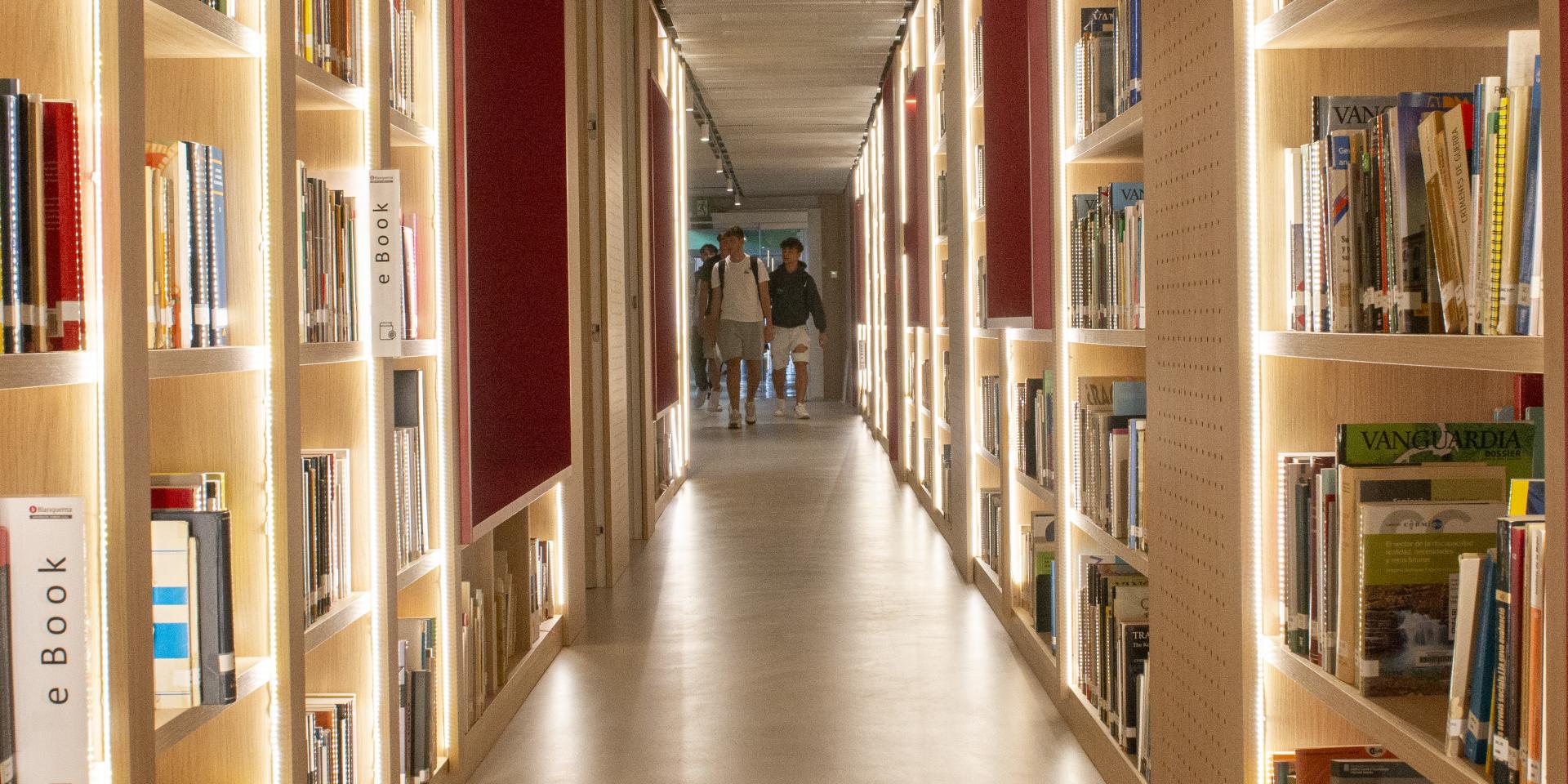
Fundació Blanquerna discounts (not cumulative with each other):
In order to apply the discount, you must prove it with the corresponding document. Students must bring the original document in person to the Academic Secretariat, together with their identification document, for validation and application of the corresponding discount.
The deadline for submitting the supporting documentation for the 2026-2027 academic year is September 30, 2026.
It is a discipline that focuses on the prevention, assessment, diagnosis, and therapeutic plan of disorders in communication, oral and written language, speech, fluency, voice, non-verbal oral functions, swallowing and hearing.
Here are some of the career opportunities you can have with a bachelor's degree in Speech and Language Therapy:
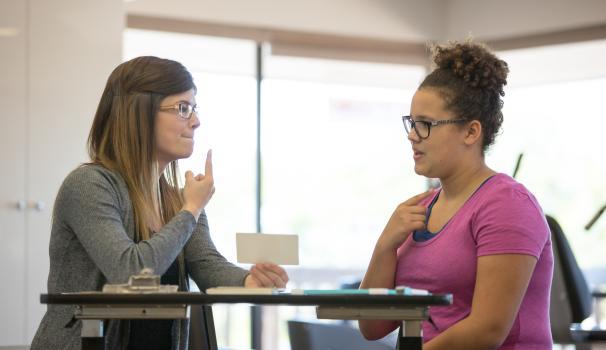
Management of speech and language therapy services in the different action areas.
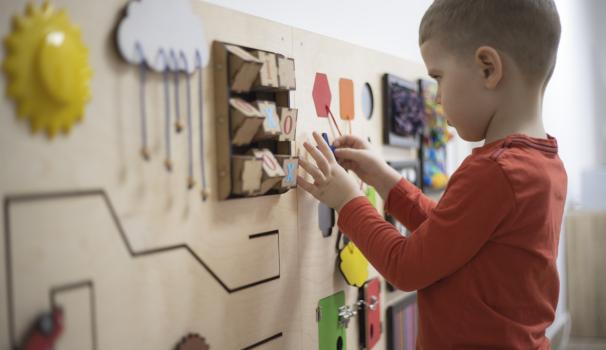
Management, coordination, and organization of multidisciplinary services and teams.

Basic and applied scientific study.
Teaching in studies related to human communication and speech and language therapy.
Trivium · Camins · Tangram UDIT · Hospital General de Catalunya
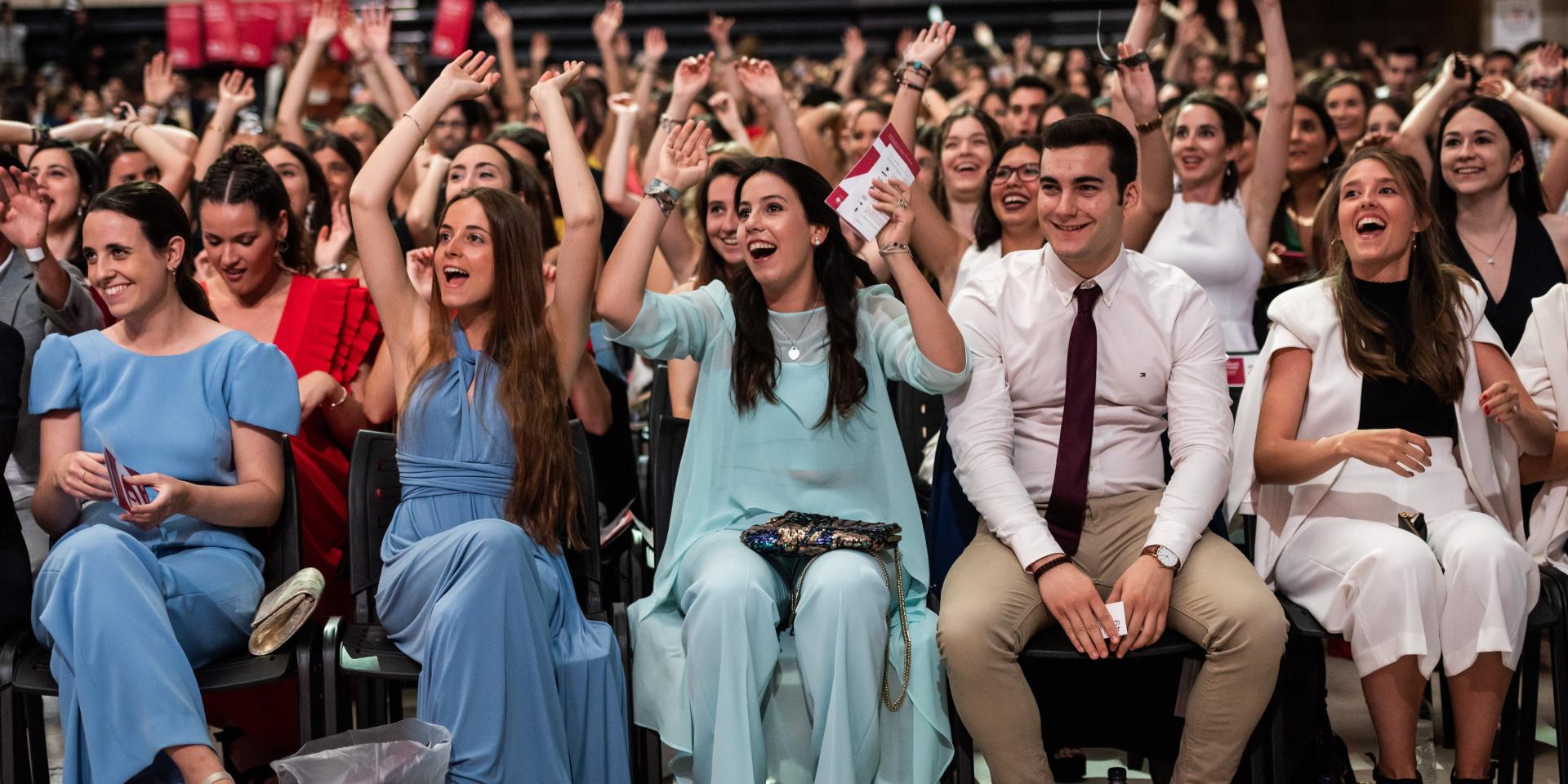
Our work doesn't finish the moment you graduate. The Alumni department will support you to enable us to achieve an employment rate of 90% of students in the first year after graduation
The Speech Therapy Laboratory is the ideal place to learn the diagnosis of speech and voice disorders or to learn about techniques for dealing with oral and written language problems.
Music learning is an essential part of education. The School has 3 spaces dedicated exclusively to working in this field: two recording rooms and a dynamic classroom for working on movement and bodily expression.
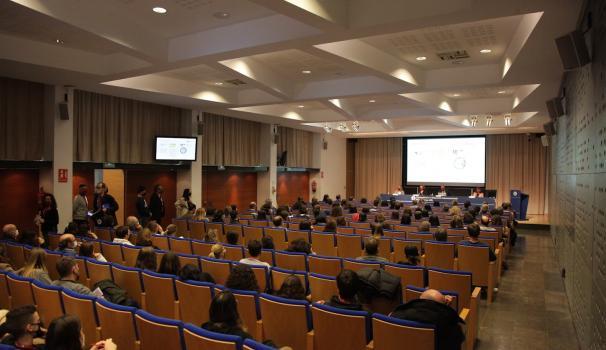
The school has an auditorium that can be used for celebrations, academic events, conferences or activities. In addition to the school's events, the space hosts other occasions that require ample space.
Do you want to improve your level of Catalan? Have you just arrived in Catalonia and don't know what to do? Are you studying English and want to reinforce your language skills? Learn at your own pace with the Language Service.
Here you will find the resources and professionals to help you achieve your goals.
If you are part of a research group, a professor or a PhD student and you need help with a project, you can ask for advice. This assistance includes analysis, guidance, help with applying for awards, and the financial management of projects.
If you need a quiet space to study or to do individual and group work, come to the library! Each school has its own library with computers, workrooms, reading points and an extensive catalog of documents you can consult in both hard copy and digital format.
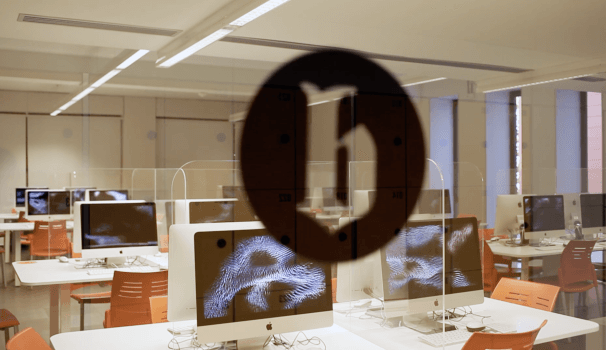
If you have a job or just need a computer, you can go to the computer classrooms or workspaces and use the Macs we have at your disposal.
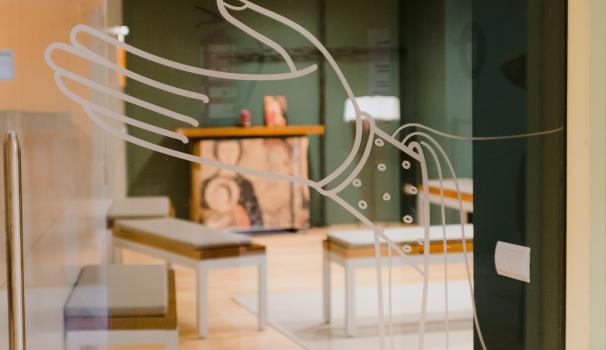
The chapel is the right place to find recollection, peace, to focus, to pray and to celebrate the Eucharist weekly and at important liturgical moments (Christmas, Ash Wednesday and Easter). The sacrament of reconciliation is also celebrated.

The 2030 Agenda Office of the Blanquerna-URL School of Psychology, Education and Sport Sciences is a project designed to ensure the achievement of the Sustainable Development Goals (SDG) and the milestones set in the Agenda, based on the joint strategies of URL institutions.
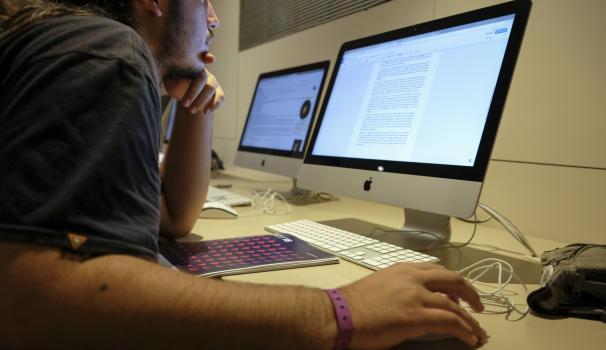
The SOPTIC (Pedagogical Guidance Service on Information and Communication Technologies) offers support in the use of ICT to both teachers and other faculty services.

Do you need guidance or support on your research project? The Methodological Advisory Service (SAM) offers you a series of procedures to guide you in your work process in the field of research.
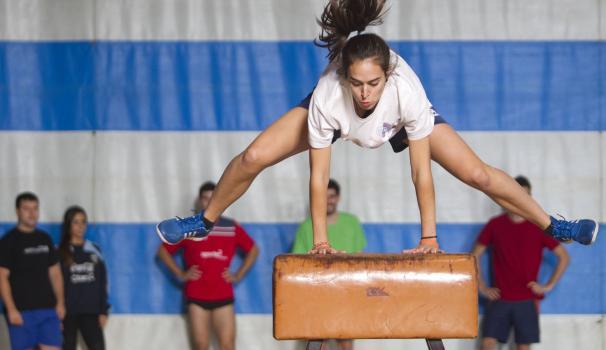
At Blanquerna we facilitate the incorporation and monitoring of the academic pace of all those people who are High Level athletes based on tutorials and personalized attention to study each case.
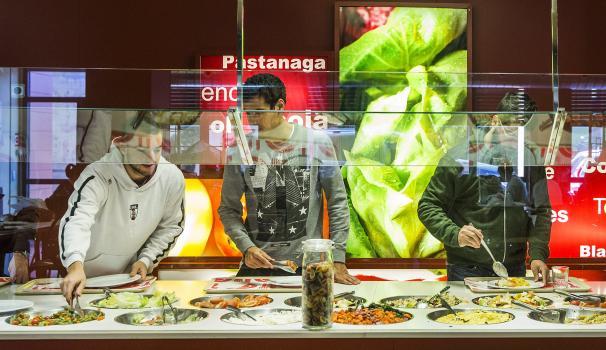
The nerve center of the quintessential faculties is the bar. There, teachers, students and staff meet throughout the day for breaks or meals.
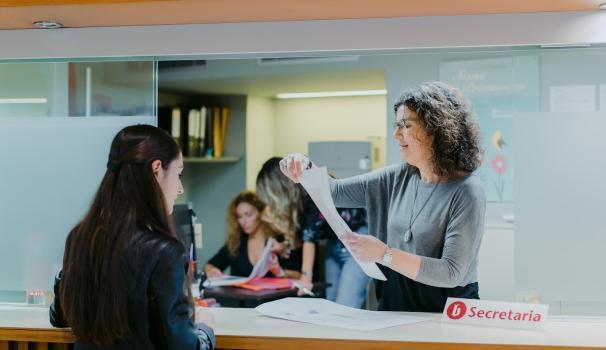
The Academic Secretaries of the Blanquerna faculties are the space for students to relate to the processes linked to the registration of official and own courses.

Would you like to receive information on pre-registration and admissions processes, scholarships and grants or validations? The SIOE is the service you need. Ask for all the information about any of these processes and discover all the possibilities at your fingertips.
Professional experience is a core part of our methodology. For this reason, we have a broad spectrum of internship agreements to meet the needs and preferences of all students. You will graduate having worked in your industry.

At Blanquerna, we put the future within everyone's reach thanks to our scholarships and grant service to start or continue studying at our schools. Financial aid is both internal and external to the university. You will find a wide range of possibilities.
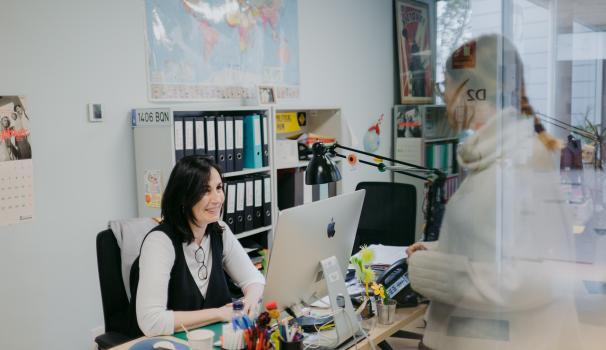
Going abroad is a unique opportunity to discover the plurality of the world. Aware of the importance of the internationalization of studies, we have established mobility agreements around the world.
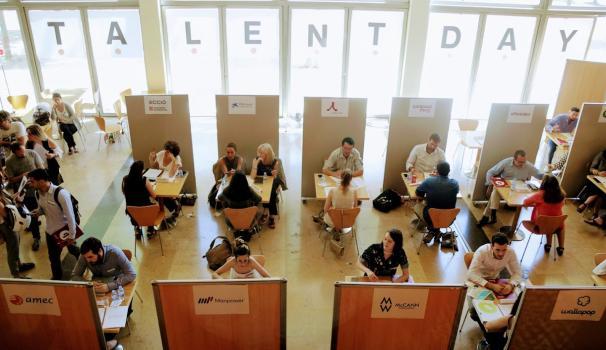
This service provides graduates with the necessary means so that they can actively participate in their professionalism and propose optimal candidates to organizations and companies looking for staff.

The leap into the world of work is always a challenge. For this reason, we provide a Job Bank for students and graduates. This service puts students in touch with companies and institutions looking for staff.
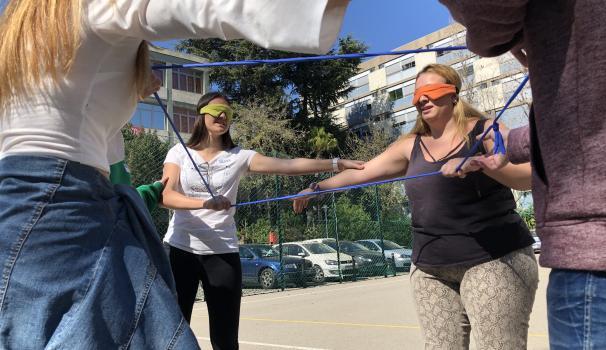
Solidarity and the struggle for human dignity are values that identify us. Solidarity Action is a volunteer program that our students can join to participate in projects in the Third and Fourth World.
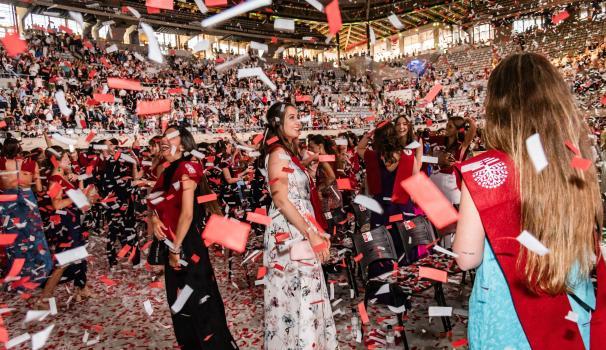
Studying in Blanquerna allows you to be part of our community. Being a college student opens the door to a lot of options for continuing your vocational training beyond your time in the classroom.
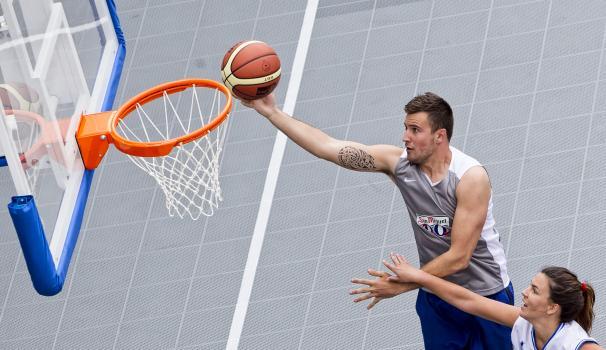
Want to represent the URL in college sports tournaments? You can find a wide range of possibilities for both individual and team sports. To be a student of Blanquerna, you will have a discount at the Can Caralleu and La Salle Sport & Fitness sports complexes.

If you are in a difficult situation in the academic, personal or social field, you can request, free of charge, the personalized attention of the SOP. This is an interdisciplinary team of professionals who will guide you in dealing with the situation.
In the three Blanquerna faculties, you will find spaces for reflection isolated from the hustle and bustle dedicated to the celebration of the Faith or cultural and religious animation. If you wish, you can also receive personalized attention and information about church life.
At Blanquerna we promote personal development at all levels to people with a diversity of specific needs from a normalizing context that encourages personal autonomy and uniqueness.
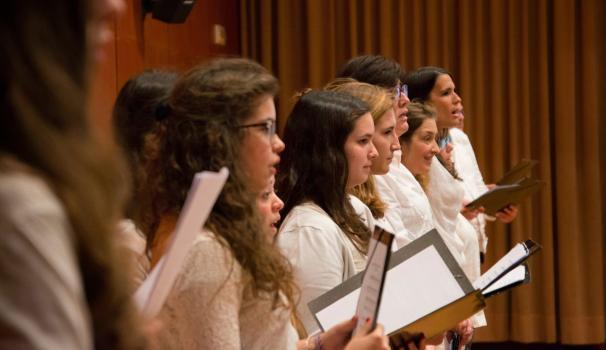
If you like music and want to take part in the concerts of institutional events and festivities, sign up for the Blanquerna Choir. There you will meet new friends and enjoy music.
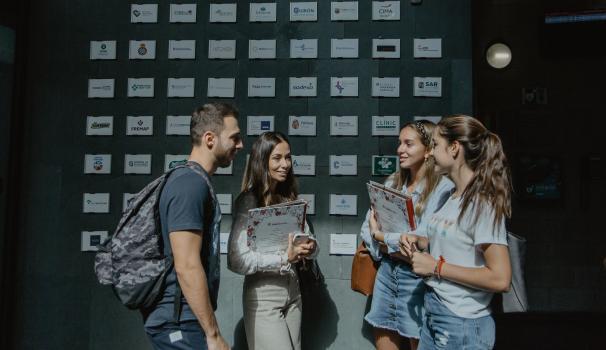
Each class group must elect a representative to put forward concerns or make proposals to the faculty members and academic management. At the same time, each degree must appoint a delegate and each school a representative on the general URL council.
Contact between students and the university is constant and is channeled through the Student Council, the body that collects proposals and requests from students and facilitates university life.

Are you studying a foreign language and want to improve your level? Do it at your own pace in the language self-learning classroom. This service offers various teaching resources and materials to practice the language.
Cristina Andres Carrillo
Cristina Günther Bel
Ledicia Iglesias Pazo
Marta Jordana Puig
Olga Viridiana Arreola Garcia
Alain G.F. Blomart
Marta Bosch Ayguade
Montserrat Canals Ventura
Josep Francesc Casamitjana Claramunt
Mercè Casanovas Pagès
Rocío Daniela Concha Ortiz
Sílvia Contreras Regatero
Mònica Egea Palma
Laura González Sanvisens
Ignasi Ivern Pascual
Marc Llinàs Folch
Laura López Blanco
Francisco Javier Medina Luque
Jaume Miró Cabrero
Natalia Molina Saiz
Manel Noguera Ballus
Miquel Palau Costafreda
Tània Puignou Santallusia
Lídia Rigual Soler
Claudia Roca Hoogsteder
Mireia Sala Torrent
Berta Salvadó Salvadó
Sara Paula Signo Miguel
Josep Maria Vila Rovira
The application process for a place in the 2026-2027 academic year begins on October 29, 2025, and consists of three phases:
The application for a place can be made online or in person and entitles the applicant to participate in the admission process.
It can be done via the Application for admission button on the page for each degree, or directly from here, and requires:
It can be done at the School itself, by going to the Student Information and Guidance Service (SIOE), and the following must be submitted:
IMPORTANT - BACHELOR'S DEGREE IN PSYCHOLOGY AND BACHELOR'S DEGREE IN NURSING: Students from High School (Batxillerat):
If, at the time of submitting the application for a place in the degrees in Psychology or Nursing, as well as for simultaneous studies in either of these two degrees (e. g., Psychology and Speech and Language Therapy, or Nursing and Nutrition), the final High School and PAU (University Entrance Exams) grades are already available and are equal to or higher than 7, the applicant will be called to enroll once admitted.
If the final entrance grades for High School and PAU (University Entrance Exams) are not available, an official certificate from the educational center must be attached, containing the average grade for the first year or the final High School grade. Once this certificate is submitted, there are two options:
Option 1. If the grade is equal to or higher than 7, the student will be called to make a conditional enrollment and may choose a shift while places are available.
Option 2. If the grade is lower than 7, the student may participate in the June place allocation, which will be based on the submitted grade as the first criterion and the date of payment of the place application as the second criterion. From the date on which the final grade of the university entrance exams becomes available, if there are still places available, only students who have submitted the certificate with their final admission grade will take part in the allocation process.
Note: In the case of students from international high schools, an official document from the school of origin must be submitted with the final average grade for the course and its equivalence to the Spanish system.
IMPORTANT - BACHELOR'S DEGREE IN PSYCHOLOGY AND BACHELOR'S DEGREE IN NURSING: Students from Higher-Level Vocational Training (CFGS):
If, at the time of submitting the application for a place in the degrees in Psychology or Nursing, as well as for simultaneous studies in either of these two degrees (e. g., Psychology and Speech and Language Therapy, or Nursing and Nutrition), the final CFGS grade is already available and is equal to or higher than 8, the applicant will be called to enroll once admitted.
If the entrance grade (neither provisional nor final) for CFGS is not available, applications for a place in the aforementioned studies can be formalized, and the student will participate in the June place allocation, which will be based on the final grade submitted via an official certificate from the educational center containing the final average grade of the qualification. The grade mentioned will be considered as the first criterion, and the date of payment of the place application as the second criterion. For the Bachelor's Degree in Psychology, 10% of places will be reserved for students from this pathway. For the Bachelor's Degree in Nursing, 30% of places will be reserved for students from this pathway.
IMPORTANT – DEGREE IN PSYCHOLOGY AND DEGREE IN NURSING: Students coming from previously started university studies:
If, at the time of applying for a place in the Psychology or Nursing degree programs, as well as for any double degree involving either of these programs (e.g., Psychology and Speech Therapy or Nursing and Nutrition), the applicant has already begun university studies, they must contact the Faculty’s Student Information and Guidance Service.
Approximately within two working days after the place application, the student will be informed by email about their admission. If admitted, the same message will invite them to formalize enrollment, including instructions on when and how to complete the procedure.
The criterion used to call admitted students to formalize enrollment will be the order of payment of the place application. For degrees with more than one shift, note that a shift may fill up during the enrollment period. The place will be definitive once the student has submitted the documentation with the final university entrance information and the first enrollment payment has been made.
For degrees taught in English, students must demonstrate a minimum B2 level of English to be admitted. The level can be accredited through the level test that all degree students must take before starting their program. To prove the minimum level, an official language certificate of B2 or higher can also be submitted: IELTS (6-7), TOEFL (IBT 90-110), CAMBRIDGE, or Official Language Schools, obtained within the last two years. Certificates from other organizations will not be accepted. The certificate does not exempt students from taking the level test to determine the English level for the first year.
It is the student's responsibility to have a level equivalent to B2 in the language of instruction of the degree to properly follow classes
The student called to enroll may choose between two options, depending on whether they already have the definitive entrance pathway or not.
Enrollment in the degree can be formalized before passing the PAU (University Entrance Exams) or CFGS or having the entrance pathway. Enrollment will be conditional on the presentation of the corresponding admission pathway. This option secures the place and allows choosing the shift, in the case of degrees with more than one shift, while places are available.
If the student does not obtain the entrance pathway, the enrollment fee will be refunded, but they will lose the place, preference in shift selection, and the amount paid for the place application (€50). If places remain available in July, they may choose to stay on the waiting list until September, and the money will be held, but they will no longer have preference for shift selection. If they do not obtain the entrance pathway by September, the enrollment fee paid will be refunded.
It will be formalized if, at the time of processing the enrollment, the student already has the university entrance pathway. They may opt for the available places and shifts.
IMPORTANT: Degrees with more than one shift may exhaust places in a specific schedule with conditional enrollment. The required documentation must be uploaded via the Document Repository.
The place will be definitive once the student has submitted the documentation with the final university entrance information and the first enrollment payment has been made.
NOTE: Students in the Communication Degrees must take an English level test that will not be exclusionary for admission but will determine the level at which they start the first year. Each student will be informed of the test date and time by email.
Studies can be paid upfront and/or in interest-free installments. If payment by installment is selected, upon enrollment the student will have two business days to pay 50% of the total cost of the enrolled credits, using their chosen form of payment; this payment will not be taken by direct debit. The remaining 50% will be divided into nine monthly payments from October to June via bank direct debit from the account provided at the time of enrollment. Prices for each academic year are updated annually.
Once payment is made, the corresponding receipt of enrollment can be viewed in the student's Document Repository and via the student's portal.
For the foreign student admission process, the following considerations and requirements must be taken into account in accordance with the prevailing regulations.
Students must apply to the Universidad Nacional de Educación a Distancia (UNED) to obtain the credential certifying that they meet the requirements to access university studies within the state education system (UNED Credential). Therefore, they do not need to take the PAU (University Entrance Exams), but without the mentioned credential, they cannot enroll in our degrees.
The education systems that can be accessed through this pathway are: Germany, Andorra, Austria, European Schools (European baccalaureate), International Baccalaureate, Belgium, Bulgaria, Croatia, Denmark, Slovakia, Slovenia, Estonia, Finland, France, Greece, Hungary, Ireland, Iceland, Italy, Latvia, Liechtenstein, Lithuania, Luxembourg, Malta, Norway, the Netherlands, Poland, Portugal, the United Kingdom, the Czech Republic, Romania, Sweden, Switzerland, China and Cyprus.
These students may access our degrees by submitting the homologation of the High School diploma from the Spanish Ministry of Education or from the autonomous communities with transferred competence, such as the Generalitat de Catalunya. Proof of application for convalidation will be sufficient for students to enroll and begin taking a bachelor's degree course, however full enrollment is conditional on convalidation being confirmed. Bear in mind that convalidating studies can take more than three months to complete, so this process should be done in parallel with the admissions process to our bachelor's degrees. If the convalidation resolution is not obtained in the terms requested by the interested party, the results of any exams taken, or the enrollment made as a result thereof, are rendered null and void.
For any questions or inquiries about the place application or enrollment process, contact [email protected]
The objective of the bachelor's thesis is to evaluate the assimilation of the core skills acquired during the bachelor's degree. Essentially, it consists of writing a research project or designing an intervention program that allows the student to prove they have assimilated the degree's competences.
The thesis is written during the fourth academic year and has its own seminar. The student decides the topic and type of thesis. To write the thesis, the student can decide to do a research project or design an intervention program that will be tutored throughout the academic year by a professor-tutor specializing in that area.
The topics may be related to any of the areas of the profession and, where applicable, may also be linked to the center where the student is doing the internship or to the School's research groups.
The work will be conducted individually or in groups. Projects must be written in Catalan, Spanish, or English. In any case, the work will have to include a summary in English, Catalan, and Spanish.
The bachelor's degree thesis will last one semester and will be supervised by a professor-advisor, both individually and in the Seminar space.
Within this space, the process carried out is shared in groups, guidelines are established, and the activity is organized. These Seminar sessions will be alternated with individualized follow-up/tutoring (in which each advisor will personally follow up on the thesis).
There will be three grading systems and assessment times:
Find the help that best suits your needs between Blanquerna scholarships and grants, public and private grants or funding grants.
Blanquerna-URL is waiting for you!
Scholarships for sporting excellence cover 80% of the enrollment and tuition fees for official degrees for one academic year. If the required level of academic excellence is maintained, the award is extended over consecutive years until the student completes the degree.
At Blanquerna-URL, we emphasize the importance of the Practicum and internships at external centers. That is why we have agreements with more than a thousand organizations and entities where you can apply your theoretical knowledge to the professional world and start focusing on your professional future based on the reality of the sector.
Hospital de la Santa Creu i Sant Pau · Hospital Universitari Vall d’Hebron · CAP Drassanes (Barcelona) · CDIAP Parc Taulí Hospital Consortium, Sant Joan de Déu Maternity and Children’s Hospital, Sagrat Cor University Hospital, Mataró Health Consortium, Parc Sanitari Pere Virgili, Fundació Vidal i Barraquer, Fundació Orienta, Fundació Puigvert, Institut Guttmann, Private Foundation, Eulàlia Torres de Beà Private Foundation, Fundació Nou Barris per la Salut Mental, CAP Drassanes (Barcelona), CAP II Maresme (Mataró), CAP Drassanes (Barcelona), CAP II Maresme (Mataró), Sanitas Sarrià Day Center, Dreta de l’Eixample Day Center (CPB), Baix Llobregat Day Hospital, Desconnecta Day Hospital, CSMA Sant Feliu de Llobregat - CSMA Pins d’or, CSMA Martorell, Badalona Mental Health Center 2, CMIJ Vilafranca del Penedès, Asociación Bienestar y Desarrollo, Associació d’Ajuda al Toxicoman (AAT), Atenció i Investigació de Sòcioaddiccions, CAT Barcelona, Centre d’Iniciatives per a la Reinserció, CASD Vilafranca del Penedès, CAS Garbivent, Red Cross, Fundació Vallparadís, Frederica Montseny social and health care center, Isabel Roig social and health centre, Fundació Salut i Comunitat, Centre de dia de Neurologia de la Conducta i Psicogeriatria ISPA, MAP Assessorament i Serveis en Geriatria, Prytanis, Residència Casal Asil de Sant Andreu de Palomar, Associació Vallès Amics de la Neurologia, Associació Catalana de Traumàtics Cranioencefàlics i Dany Cerebral (TRACE), Uszheimer per a Malalties Neurodegeneratives Private Foundation, INA Memory, Teràpia Integral Uparkinson, CDIAP Parc Taulí Hospital Consortium, CDIAP Del Garraf, CDIAP ASPACE, CDIAP L'Espiga, CAD Terrassa, Jaume Cuspinera Occupational Training Center, Fundació CROMOSUMA, Fundació Projecte Aura, Fundació Rubricatus, Fundació Prevent, ASPROSEAT Group, Centre de Psicologia Humanista Miroia, Centre Psicopedagògic i Logopèdic Trivium, Consulta i Veu, IPSIDE, Psychology and Development, Centre de Reeducació Psicopedagògic i Logopèdic, Vall d’Hebron Oncology Research Institute - VHIO, Fundació BarcelonaBeta Brain Research Center, Clúster Barcelona, Promoció i Canvis per la Salut, Entredogs Therapy, Fundació Mona, Associació Humanimàlia, Equinoteràpia Associació Delta del Llobregat, El Racó de Milú, Penitentiary centres, Technical Advice and Victim Assistance Team, Barcelona Criminal Technical Advice Team, Family Environment Technical Advice Team, Secretariat for Criminal Measures, Reintegration and Victim Support, Mediation and Technical Advice Service, ITA, Center for Prevention and Treatment of Anorexia and Bulimia (ABB), Khepra, SETCA.
As the European Union points out, gender equality is not only a matter of social justice but also affects the results of teaching and research. Promoting gender equality in research and innovation is one of the European Commission's commitments, and it supports the explicit integration of a gender perspective in Horizon 2020 projects. However, this recommendation is often poorly understood and misapplied. Various documents are presented here with a view to contributing to a better understanding and application of the gender perspective in teaching and research.
RELATED PROGRAMS
We equip you for change






